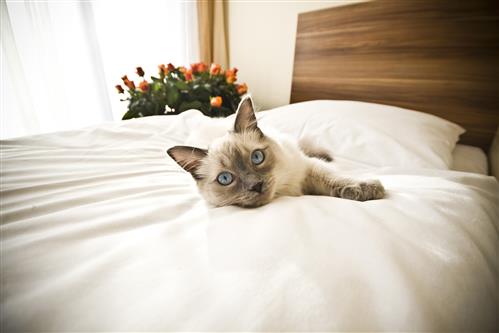Five Common Cat Personality Types
Like many animals, cats have unique quirks and personality types. If you own more than one cat, this fact is especially apparent, as even kittens from the same litter can display drastically different behaviors. For example, one cat may love to run amok at all hours of the night, while another refuses to leave his favorite hiding place under your bed. Here are five common cat “personality types” – which does your pet fall under?
The Mischievous Cat
Also known as the “party animal,” this type of cat is known to have a lot of energy. If your cat is rambunctious, he may run and play all day – and night – long. Though playful cats can be a lot of fun, they may expel excess energy by damaging furniture or a quality cat door in the home. Prevent this type of behavior by making sure your cat has plenty of exercise and visual stimulation to ward off boredom. For example, providing plenty of toys and one-on-one bonding.
Cuddling Kitties
While some cats rarely seek physical affection from their owners, others love to snuggle. It’s generally suspected that the younger a kitten is when it enters an owner’s life, the more likely it will become a cuddly and loving pet. You can also attempt to increase the friendliness of your cat using playtime and positive reinforcement with treats.
The “Beta” Cat
Similar to the cuddlers, a Beta cat loves to be by your side. Beta cats typically spend their time mimicking their owner’s behavior: if you’re watching TV, they’ll join you on the couch. Some owners even say they can’t even write an email without Betas coming over to investigate! However, this personality type is less about snuggling and more about being in charge. Betas use their intelligence and social skills to communicate their needs. What’s also interesting: in a home with several cats, the Beta cat becomes the leader of the pack. Their job as leader is to “translate” requests between cats and owner. For example, getting your attention when the litter box needs cleaning or when food is running low.
Sneaky and Shy
Some cats prefer to keep to themselves, and stay confined to a hiding place in your home, like a closet or cabinet. If you adopt a new cat, it may take some time to adjust. Be patient: don’t try to speed up the getting-to-know-you process by forcibly removing the cat or petting during hiding. These actions could make your cat lose trust in you. Instead, let him come and go as he pleases, and use feedings as reinforcement. You can also try hand-feeding treats to your cat in order to coax him out of hiding.
Independent Felines
Self-reliant cats are smart and cunning, but might not be the best pet for those who want a loving and cuddly friend. Independent cats love to be the center of attention, yet have the tendency to let their curiosity get the best of them. This often results in messes and broken items around the home. This personality is the type of cat that must learn from their own mistakes, making them great candidates for training, like using water in spray bottles to prevent unwanted behavior.
For more tips to help you understand your cat’s personality, read our blog each week. There we share ideas for pet owners, as well as information about our quality pet doors that give your pet freedom to roam. For more info about our products, please call 0414 922 751.

